PLATO'S CRATYLUS
Studies in Continental Thought
EDITOR
JOHN SALLIS
CONSULTING EDITORS
| Robert Bernasconi | J. N. Mohanty |
| Rudolf Bernet | Mary Rawlinson |
| John D. Caputo | Tom Rockmore |
| David Carr | Calvin O. Schrag |
| Edward S. Casey | Reiner Schrmann |
| Hubert L. Dreyfus | Charles E. Scott |
| Don Ihde | Thomas Sheehan |
| David Farrell Krell | Robert Sokolowski |
| Lenore Langsdorf | Bruce W. Wilshire |
| Alphonso Lingis | David Wood |
| William L. McBride |
PLATO'S CRATYLUS
The Comedy of Language
S. Montgomery Ewegen
Indiana University Press
Bloomington and Indianapolis
This book is a publication of
Indiana University Press
Office of Scholarly Publishing
Herman B Wells Library 350
1320 East 10th Street
Bloomington, Indiana 47405 USA
iupress.indiana.edu
Telephone orders 800-842-6796
Fax orders 812-855-7931
2014 by Shane Montgomery Ewegen
All rights reserved
No part of this book may be reproduced or utilized in any form or by any means, electronic or mechanical, including photocopying and recording, or by any information storage and retrieval system, without permission in writing from the publisher. The Association of American University Presses Resolution on Permissions constitutes the only exception to this prohibition.
 The paper used in this publication meets the minimum requirements of the American National Standard for Information SciencesPermanence of Paper for Printed Library Materials, ANSI Z39.48-1992.
The paper used in this publication meets the minimum requirements of the American National Standard for Information SciencesPermanence of Paper for Printed Library Materials, ANSI Z39.48-1992.
Manufactured in the United States of America
Library of Congress Cataloging-in-Publication Data
Ewegen, S. Montgomery.
Plato's Cratylus : the comedy of language / S. Montgomery Ewegen.
pages cm. (Studies in Continental thought)
Includes bibliographical references and index.
ISBN 978-0-253-01044-5 (alk. paper) ISBN 978-0-253-01051-3 (eb)
1. Plato. Cratylus. 2. Language and languagesPhilosophy. I. Title.
B367.E94 2013
184dc23
2013010885
1 2 3 4 5 18 17 16 15 14
For the Bear, the Platypus, the Cat, and the Magpie and in memory of Waldo and Sren
A  , Eternity is a child playing, moving pieces in a game. Kingship to the child.
, Eternity is a child playing, moving pieces in a game. Kingship to the child.
Heraclitus, Fr. 52; trans. Kahn, slightly modified
Big things, child of Hipponicus, you ask. But there is a serious way of talking about the names of these gods and a playful way. So ask some others for the serious way; but there is nothing to prevent us from passing through the playful way. For even the gods are lovers of play.
Cratylus, 406bc (my translation)
CONTENTS
PREFACE
A book such as this does not require an extensive and ponderous preface: rather, a short and ponderous preface will suffice. Far from being an exhaustive treatment of Plato's Cratylus, this book hopes to show the impossibility of exhausting the Platonic dialogue. Even after this work there is much that remains concealed in Plato's Cratylus, and shall perhaps forever remain concealed. My hope is that this present work will inspire new and creative research into this exquisite and tremendously complex dialogue. To all those future interpreters of Plato's challenging work, I offer you the same self-serving words that Socrates offers Cratylus at the end of the dialogue that bears his name: You must continue to consider [these matters] courageously and thoroughly and not accept anything carelesslyfor you are still young and in your prime; then, if after investigating, you find the truth, please share it with me (44od).
A cold day in BostonJanuary, 2013
ACKNOWLEDGMENTS
Too many to count have brought the fire to me, always selflessly, never tiring, superabundant. The inadequacy of offering mere words in gratitude for such overflowing warmth is a burden that those who have benefited from others must bear. But gratitude is neither a currency nor a form of compensation: rather, it is an acknowledgment of the impossibility of paying back the gifts that one has received. I offer my limitless, yet forever insufficient, gratitude to John Sallis, Jerry Sallis, Robert Metcalf, Marina McCoy, Drew Hyland, Mary Troxell, and Yvonne and Robert Ewegen. I thank also Dee Mortensen and Indiana University Press for their help and support, and Emma Young for her invaluable assistance. I am grateful, too, to Joe Sachs for his excellent and timely translation of the Cratylus. I offer endless gratitude to Maggie, who has had to live with me during the creation of this book and will, hopefully, be living with me for the creation of many more. Finally, I offer this book to Sren, the greatest cat in the universe, who sat on it at every stage of its creation. May the finished product be as comfortable to you as were the many drafts leading up to itand may there be hardbound books, potent catnip, and buttery croissants in kitty heaven.
NOTE ON TRANSLATIONS
No translation of the Cratylus is perfecta hermeneutical fact owed not to the failures of any particular translator, but to the richness and essential ambiguities of the Cratylus itself. In what follows I have made extensive use of Joe Sachs excellent translation, as well as that of the great H. N. Fowler. In order to emphasize certain themes or correct what I perceive to be misleading phrases, I have occasionally modified the translations. (In particular, I have opted for the more common correct over Sachs rightness for interpretive reasons that will become clear.) Occasionally I offer my own translations (whatever that means), though even in these cases, I often use the generally superior translations of Sachs and Fowler for orientation and verification.
It is recommended, but by no means necessary, that one keep the Greek text handy as one reads the following book, even if one does not read Greek. As will be seen, the principle behind Socrates view of language entails the material (which is to say visible and audible) similarities between words. It is therefore exceedingly helpful for understanding the text to be able to look upon these similarities as they occur. It is impossible to do so with any translation, no matter how good. The Cratylus, perhaps more than any other Greek text, demands to be looked at.
LIST OF TEXTUAL ABBREVIATIONS
The following is a list of the abbreviations used within the present work when referring to Plato's texts. Note that if a Stephanus number is cited without being preceded by one of the following abbreviations, the citation is from the Cratylus.
| Ap. | (Apology) |
| Epist. | (Letters) |
| Euthd. | (Euthydemus) |
| Euthr. | (Euthyphro) |
| Hipp. | (Hipparchus) |
| Lg. | (Laws) |
| Phd. | (Phaedo) |
| Phdr. | (Phaedrus) |
| Phil. | (Philebus) |
| Prot. | (Protagoras) |
| Rep. | (Republic) |
| Stat. | (Statesman) |
| Symp. | (Symposium) |
| Tht. | (Theaetetus) |


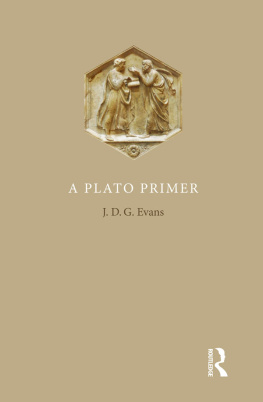
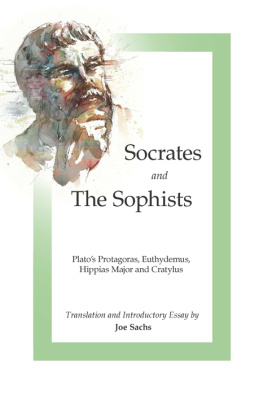
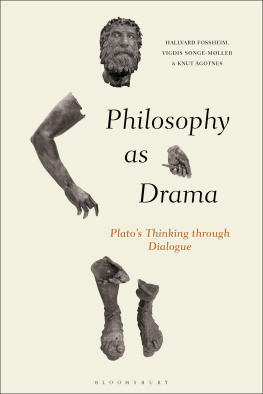

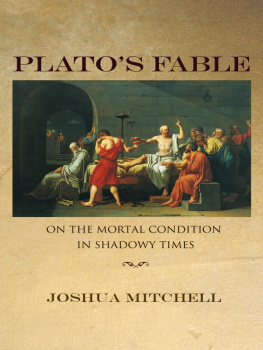
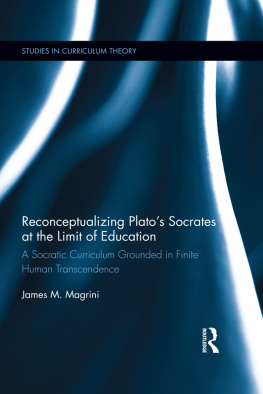
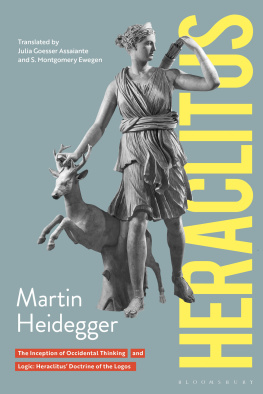
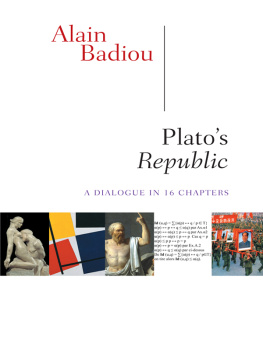
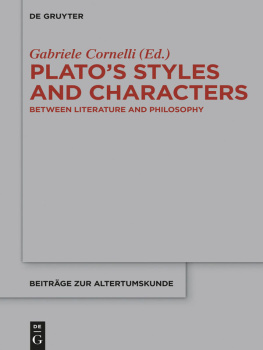
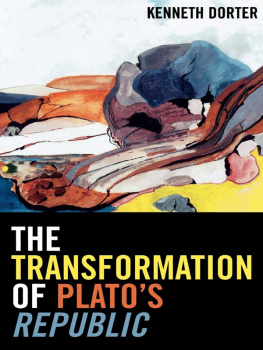
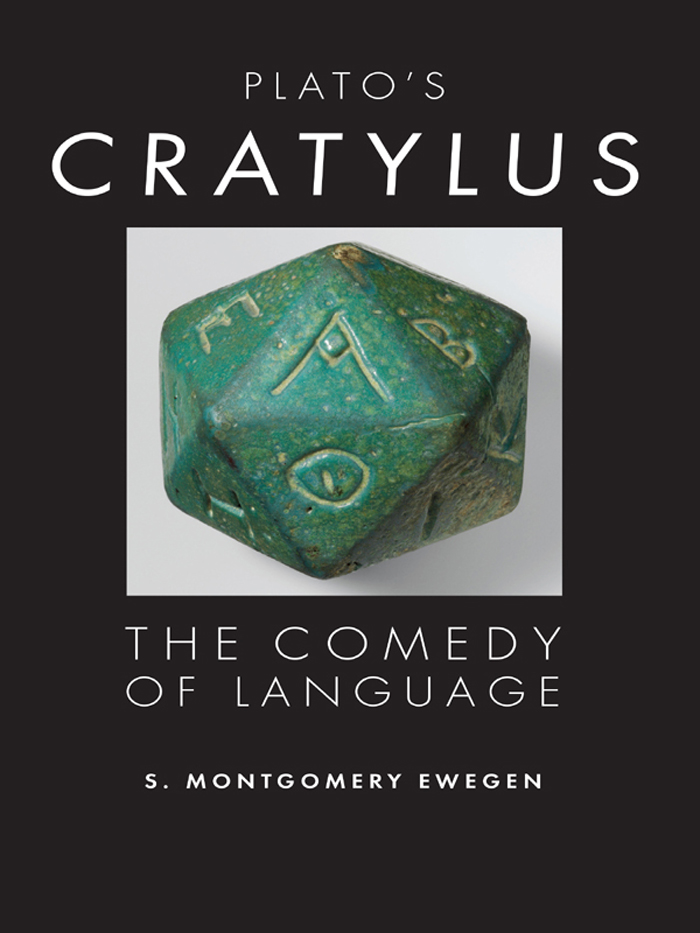
 The paper used in this publication meets the minimum requirements of the American National Standard for Information SciencesPermanence of Paper for Printed Library Materials, ANSI Z39.48-1992.
The paper used in this publication meets the minimum requirements of the American National Standard for Information SciencesPermanence of Paper for Printed Library Materials, ANSI Z39.48-1992. , Eternity is a child playing, moving pieces in a game. Kingship to the child.
, Eternity is a child playing, moving pieces in a game. Kingship to the child.